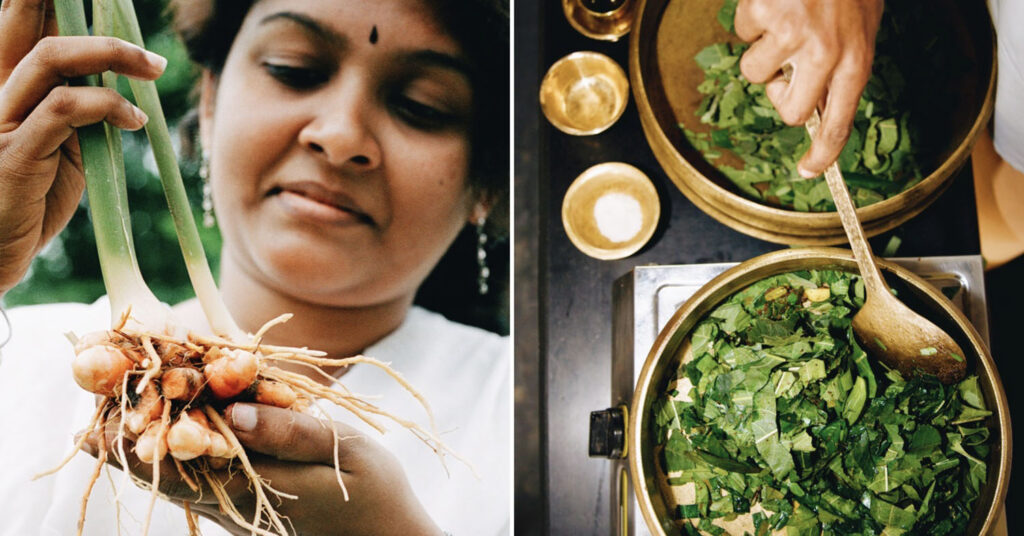Although it’s now easy to accept veganism as a mainstream diet and lifestyle, the concept began several centuries ago in the East. Veganism and spirituality have a long, symbiotic history. Respect for animals and the earth are rooted in many Eastern religions, and the modern plant-based diets of today owe their origins to a rich cultural history often left out of the conversation.
Do religion and plant-based diets go hand-in-hand?
For communities that practice the dharmic religions of Jainism, Hinduism, and Buddhism, it was natural to gravitate toward a vegan diet. Adopting the plant-based lifestyle was a practice of religious doctrine and faith. In Jainism, practicing veganism is a modern way to implement nonviolence toward all living beings. Adopting a plant-based lifestyle is related to the tenet that all living beings should be on equal footing and treated with compassion. This same philosophy is seen in Hinduism and Buddhism. Hindus believe in karmic consequences and by purposely inflicting pain on animals the equivalent amount of suffering must be experienced by the party who chooses to harm. In Buddhism, one of the five moral precepts includes abstaining from taking life.
According to The Vegan Society, veganism “is a philosophy and way of living which seeks to exclude—as far as is possible and practicable—all forms of exploitation of, and cruelty to, animals for food, clothing, or any other purpose; and by extension, promotes the development and use of animal-free alternatives for the benefit of animals, humans, and the environment. In dietary terms, it denotes the practice of dispensing with all products derived wholly or partly from animals.”
Many Westerners may view veganism as a lifestyle choice or way to lead a healthier life, but for Easterners, it has never been a trend, but one of the ways to honor religion, cultivate spirituality, and live by the principles of ahiṃsā.
How veganism promotes nonviolence
The concept of ahiṃsā is attributed to Indian leader, Mohandas Karamchand Gandhi (also known as Mahatma Gandhi), a lawyer and political ethicist who successfully led India’s revolution for independence from England. The subterfuge underneath his movement resided in ahiṃsā, which he defined as “nonviolence is the basis for the search of Truth.” Gandhi said that ahiṃsā gave the search for Truth meaning. “Therefore the search shall be futile if not founded on ahiṃsā as its basis.”
For some, the easiest way to practice ahiṃsā is to adopt a vegetarian or vegan diet. It is estimated in the United States, this year, approximately 9 billion animals have been killed for human consumption within factory farms alone. By being kind to animals and not consuming them, vegan practitioners are integrating ahiṃsā into their daily lives. Actively engaging in compassion toward animals is an identifiable way to practice ahiṃsā.
Divya L. Selvakumar, Ph.D., a registered dietician and the founder of Divine Diets, commented that certain religions have become a natural extension of the principles of ahiṃsā. “Hinduism, Buddhism, and Jainism all promote the concept that each and every living creature has a soul and should be respected. All human beings are obligated to show respect, compassion, kindness, and humility to living creatures.”
Hinduism is often referred to as the oldest religion in the world. The evidence of ahiṃsā is found within the Vedas, the ancient Hindu scriptures. “Ahiṃsā is considered to be among the highest virtues,” said Selvakumar.
India gave birth not only to Hinduism, but also to Buddhism. This religion was heavily influenced by Hindu concepts of karma and reincarnation. “Ahiṃsā is heavily promoted, as violence is contrary to the teachings of the Buddha,” Selvakumar told LIVEKINDLY. Ahiṃsā is also a weapon of the strong, in the quest to overcome suffering and distress.
Jainism founder Lord Mahavira took the concept of ahiṃsā to several different levels. Selvakumar asserted that Mahavira “preached that nonviolence must be practiced both physically, mentally, and emotionally. Animals must be treated with the greatest amount of compassion, where they should never be neglected, beaten, or bound.”

How is Ayurveda connected to spirituality and veganism?
Central to the Eastern philosophy of ahiṃsa—the practice of nonviolence against living beings—is a philosophical underpinning of veganism. An Ayurvedic diet involves eating or restricting certain foods based on your body type in order to promote wellness and mindfulness. Adopting an Ayurvedic diet, the world’s oldest holistic wellness system, is a practical manifestation of ahiṃsā.
Priya Shah, founder of wellness line Koppen Ayurvedics, added that the practice of “nonviolence has led to many Jains adopting vegetarian and vegan diets—by practicing veganism, particularly, they are practicing nonviolence towards a larger body of living beings than they would be, should they practice only vegetarianism or adopt a carnivorous diet.” Some devout Jains avoid eating root vegetables (ie., garlic, onions, carrots) as this is seen as “killing a higher living being since the root itself is the source of life,” Shah told LIVEKINDLY. Lord Mahavir is quoted as saying “all breathing, existing, living, sentient creatures should not be slain, nor treated with violence, nor abused, nor tormented, nor driven away,” said Shah.
All three religions recognize each living organism has a soul and should be respected, not killed for food or sport.
Hinduism, Buddhism, and Jainism agree that we are all part of the universe. Dr. Virender Sodhi, one of the first Ayurvedic and naturopathic physicians in the United States and a partner in Arizona Naturopathic Medical Association, said that these religions do not separate humans from animals, trees, bugs, or waterfalls. Rather, these three focus on connection. Dr. Sodhi said, “Ahiṃsā means nonviolence, so when we are using animal products, it is often considered violent. We are severing a connection not just with the animal, but with ourselves. Many vegans see this similarly.”
Gut health is a key component of Ayurveda
Dr. Sodhi further explained the qualities different types of energy can inhabit: “sattvic” energy is pure potential and universal intelligence, “rajasic” energy is the factor of movement, and “tamasic” energy is the inertia of stillness (i.e., death is considered tamasic). Sattvic energy aligns with creativity, rajasic energy aligns with sustainability, and tamasic energy is common with destruction. In Ayurveda, animal protein is considered tamasic.
Selvakumar expanded on Ayurveda and the digestive system: “The emphasis on gut health has been a core tenant of Ayurveda for thousands of years, and one defining characteristic is its relationship with nature. Ayurveda teaches that we do not live in a separate state from nature. Instead, we are one with it, integrated to such a degree, that nature provides us what we need when we need it to promote proper health and well-being,” says Selvakumar. The emphasis on eating seasonal fruits, vegetables, and grains is ideal for adopting a vegan diet. At the intersection of Ayurveda, veganism, and diet is a common theme—there is a strong connection between the body and mind, and this connection can be nurtured and maintained through mindful living and eating.
How to incorporate Ayurveda lessons into your diet
Shah suggests that incorporating Ayurvedic practices into daily life is a fundamental way of living in India—it is practiced by everyone, everywhere, from rural villages to bustling urban cities. Here are four ways to incorporate Ayurveda into your diet.

Understand your body type
In Ayurveda, there is a focus on the dosha, or body type. There are three body doshas—Vata, Pitta, and Kapha. Each of these doshic body types uses metabolic energy in a unique way. Vata spends energy. Pitta manages it. Kapha stores it. In Ayurveda, it is believed that your body type affects everything about your physical and mental health—from your digestion to your psychology. There are also imbalances for each body type.
“A trained Ayurvedic practitioner can determine a person’s dosha with a thorough questionnaire based upon a person’s lifestyle,” Selvakumar told LIVEKINDLY. A person’s diet, sleeping patterns, bowel habits, and stress management levels are considered, as well as examining a person’s eyes, tongue, and nails. Vata dosha is grounded in air and ether and also movement and communication. “People are very active, creative and gifted with a natural ability to communicate.” The Pitta dosha is based on fire and water and people tend to be intellectual, brave, ambitious, and gravitate toward anger, rage, and jealousy. In the Kapha dosha, based on water and earth, people are laid back, compassionate, patient, and develop an attachment to others.
Understanding which foods best support your dosha will help you understand which plant-based foods can strengthen your optimal wellness. Sweta Vikram, an Ayurveda coach, explained how specific foods can impact health based on a person’s dosha. “Depending on a person’s doshic balance and imbalance, certain foods might be recommended,” Vikram suggested.

Eat seasonal foods
Ayurveda’s teaching of seasonal eating is also known as “Ritucharya.” Ritucharya is a “practice in which what you eat is in sync with nature and thus is believed to be the ultimate form of preventative health—eating cooler and sweeter fruits (melons and strawberries) used in summer recipes to cool down the body, or using earthy and hearty vegetables like squash and zucchini during the winter to warm the body,” Shah told LIVEKINDLY. This emphasis on eating seasonal fruits, vegetables, and grains is often the ideal reason for adopting a vegan diet.

Cook with indigenous spices
Dr. Sodhi has personally witnessed veganism’s popularity. “When I first began working in Washington state in 1986, the South Asian population here would complain there were no vegan restaurants in town. Now there are so many restaurants. The demand continues to rise for veganism and vegan options.” He says this has a dual impact. “Even if you don’t know Ayurveda deeply, you will combine flavors in classic South Asian cuisines that mirror the medicinal effects of Ayurvedic treatments.” For instance, “ginger, turmeric, coriander, are now common in restaurants and in households, but people did not know these ingredients when I first moved here. He also points to chai as an example–the combination of ginger, black tea, peppercorns, fennel, and cardamom is an Ayurvedic treatment to improve digestion, which, in turn, improves energy. We see this chai in most parts of the world.”
Practice mindfulness in living and eating
The intersection of Ayurveda, veganism, and diet is a common theme. There is a strong connection between the body and mind, and this connection can be nurtured and maintained through mindful living and eating.
“It is not considered a ‘self-care routine’ or ‘wellness practice,’ but rather a time-tested approach to living a balanced life,” Shah told LIVEKINDLY. For example, haldi doodh (known in the West as turmeric lattes or golden milk) is an age-old, time-tested drink used to heal colds and boost immunity.
The lessons written in Ayurvedic texts are everyday staples of life for many in India. Shah emphasizes that at its core, “Ayurveda points to the importance of diet as playing a large role in maintaining the equilibrium between body, mind, and soul.”


